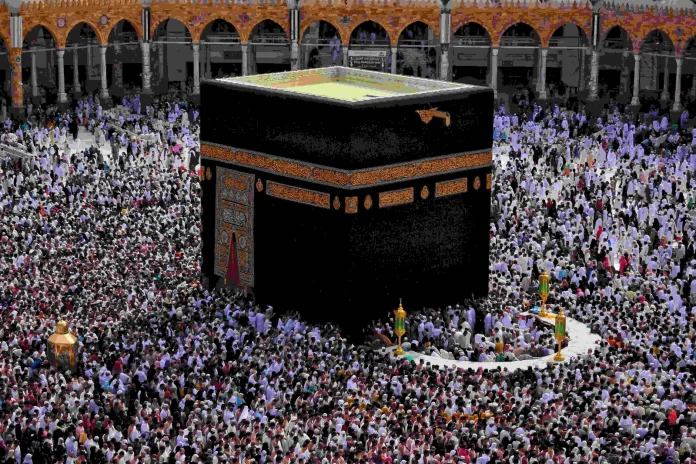Hajj is a transformative process, promoting growth in cultural and spiritual dimensions, fostering a sense of global Muslim unity, and reinforcing the principles of perseverance, knowledge, awareness, and action.
– P.P. Abdul Razak
Islam stands as one of the most organized practicing religions globally, with a strong emphasis on communal or congregational rather than individual worship. Muslims around the world congregate in local mosques five times daily, gather for the larger Juma prayer every Friday, and collectively observe fasting during Ramadan each year. They also give Zakat, the obligatory charity, in a communal manner. Annually, the Hajj pilgrimage acts as a global conference, drawing nearly three million Muslims from all corners of the world. This communal practice extends to the observance of two major Islamic festivals, Eid al-Fitr and Eid al-Adha, which follow the fasting of Ramadan and the pilgrimage of Hajj respectively, symbolizing a spiritual and physical reward after a period of rigorous devotion. This article explores the significance of Hajj, which provides pilgrims with unique experiences, instills piety, and inspires profound reflections.
Hajj, while being an annual gathering, symbolizes unconditional obedience to Allah’s will and connects deeply with human history. According to the Quran, the Ka’ba in Makkah is the first House of Worship appointed for humanity (3:96). Pilgrims, by journeying to Makkah, reconnect with their spiritual roots. The Quran emphasizes this return to origin: “Remember when We made the House (the Ka’ba at Makkah) a place to return for mankind and a place of safety.” (2:125) Additionally, the Quran describes Makkah as “Mother of all towns,” signifying the birthplace of human civilization.
Islam’s humanitarian message is evident in its teachings, with the Quran addressing humanity collectively. Verses from the Quran illustrate this:
– The Quran for Mankind: “The month of Ramadan in which the Quran was revealed, as a guidance for mankind and clear proofs for the guidance and the criterion between right and wrong.” (2:185)
– The Prophet for Mankind: “We have sent you, O Muhammad, not but as a mercy for mankind.” (21:107)
– The Muslims as a just nation for humanity: “Thus We have made you Muslims a just nation that you be witness over mankind.” (2:143)
– Hajj & Mankind: “And proclaim to mankind the Hajj.” (22:27)
Hajj, therefore, encapsulates the spirit of Islamic humanism, where pilgrims engage in a journey of self-discovery, communal living, and spiritual reflection.
The rituals of Hajj, such as Tawaf (circumambulation of the Ka’ba), Sa’i (running between Safa and Marwa), and the stoning of the devil in Mina, are deeply symbolic. Tawaf represents communion with the universe, mirroring the atomic and cosmic movements, and reinforcing a pilgrim’s commitment to a life aligned with universal principles. The black stone in the Ka’ba, believed to be of heavenly origin, symbolizes a connection between the earth and Paradise, underscoring the Islamic belief in the hereafter.
The journey through Hajj begins with Ihram, a state of purity and equality, symbolizing the pilgrim’s entry into a new, spiritually focused life. Sa’i, the running between Safa and Marwa, commemorates Hajara’s perseverance in her search for water, emphasizing the importance of striving and prayer combined. The well of Zamzam, which miraculously appeared during her search, symbolizes the rewards of perseverance and faith.
On the plains of Arafa, pilgrims seek knowledge and reflect on their existence, drawing connections from the past to guide their future. This place symbolizes the great assembly of humanity and the meeting point of past, present, and future.
After Arafa, pilgrims move to Muzdalifa, where they gather stones for the ritual stoning of the devil. This act symbolizes the rejection of evil and a commitment to overcoming personal and external challenges. The stoning ritual in Mina, which involves pelting three pillars representing Satan, underscores the continuous struggle against temptation and sin.
The final days of Hajj involve the sacrifice of an animal in commemoration of Prophet Abraham’s willingness to sacrifice his son in obedience to Allah. This act of sacrifice symbolizes the surrender of one’s own will to God’s will, marking the culmination of the pilgrim’s spiritual journey.
In essence, Hajj is a transformative process, promoting growth in cultural and spiritual dimensions, fostering a sense of global Muslim unity, and reinforcing the principles of perseverance, knowledge, awareness, and action. It is a journey that profoundly impacts a pilgrim’s life, turning them into more conscientious, devout, and community-oriented individuals.




